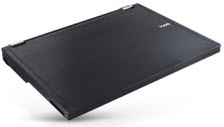Are "instant on" notebooks the future?

Dell has previewed a new instant on technology that allows users to carry out basic tasks on their notebooks without having to boot up into Windows. Is this the future for notebooks?

Instant on technology isn't a new thing. Dell Latitude ON is similar to ASUS' ExpressGate or Voodoo's IOS technologies which are powered by Splashtop.
Instant on technologies have a number of potential upsides for the end user. Speed of boot-up (near instant) and increased battery life are two obvious benefits, but there are others. Having your browsing and email isolated from the main bulk of your data is highly desirable (as is browsing within a secure environment that's resistant to malware such as keyloggers), as is having access to an environment that's resistant to being crippled by a dodgy driver or misbehaving software could be very useful at times.
If I think about my normal notebook usage patterns, I'm pretty sure I could spend a good 80 - 90% of my time in the instant on environment and only boot into Windows when I needed to do something specifically Windows-centric. In fact, given a properly set up Linux distro as the main OS (which should be a snap to set up since these systems would/should already be Linux-compatible because they are running the Linux-based instant on OS ) which would allow me to handle Microsoft Office docs, and a VPN, I could do away with having Windows on the system altogether and simply connect to a secondary Windows-based PC when I wanted that functionality (when on the road I rarely, if ever, need to run anything heavy such as Photoshop).
The only problem (for Dell at any rate) is that as soon as you start living (and enjoying) the instant on environment, you start wondering whether you need a Dell at all and whether what you really need is something like the ASUS Eee PC.
Given all the attention that instant on is getting, how long until Microsoft develops a similar environment (think cut-down Windows Mobile)? ASUS' ExpressGate is already bringing a lightweight Linux environment to millions of ASUS motherboard owners, and now Dell is set to make this audience even bigger. For Microsoft, all this focus on end user benefit driven by Linux can't be a good thing.
Thoughts?